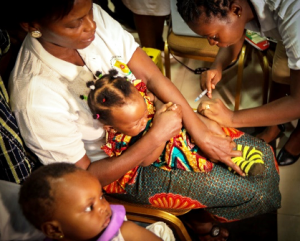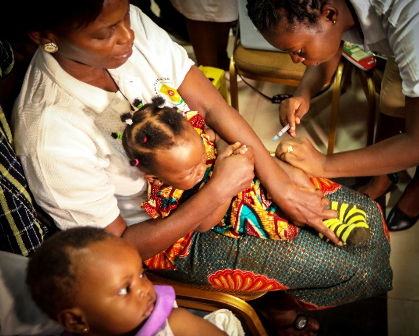Ghana launches Malaria vaccine pilot

WHO
Ghana became the second country onTuesday April 30, after Malawi, to launch the world’s first malaria vaccine in a landmark pilot programme to be implemented in three African countries for children up to 2 years of age. Kenya, the third country, is expected to roll out the programme in the coming weeks
The programme officially kicked off at Ewim Polyclinic in Cape Coast at a ceremony attended by top health officials, WHO representatives, community leaders, mothers and children.
The country-led phased vaccine introduction is supported by WHO and national and global health partners.
“This is a day to celebrate,” said WHO Representative for Ghana Dr Owen Kaluwa. “This breakthrough in malaria control caps a 30-year effort to develop a vaccine with proven results to help prevent malaria in young children. The malaria vaccine has the potential to save tens of thousands of children’s lives.”
Dr Kaluwa congratulated the Ministry of Health of Ghana for its commitment to the RTS,S vaccine pilot and what it could mean to improve child health and malaria control.
“Malaria is one of the most devasting maladies in our history and we in Africa bear the brunt of its toll on the world. Globally, and in Ghana, we have made significant gains to control malaria in the last 15 years, but progress has stalled and even reversed in some areas. We need new solutions as we continue our fight against malaria and this vaccine gives us a promising new tool,” he said
Susana and Abigail, both age 6 months, were then vaccinated – the first children to receive the malaria vaccine in the Ghana pilot – in front of the attending audience of about 300 health workers, national immunization and malaria specialists and community supporters.
Over the next four years about one million babies are expected to be vaccinated with four doses of the vaccine.
RTS,S is the first, and to date the only, vaccine that has demonstrated it can significantly reduce malaria in children. In clinical trials, the vaccine was found to prevent approximately 4 in 10 malaria cases, including 3 in 10 cases of life-threatening severe malaria.
The pilot programme is designed to generate evidence and experience to inform WHO policy recommendations on the broader use of the RTS,S malaria vaccine. It will look at reductions in child deaths; vaccine uptake, including whether parents bring their children on time for the four required doses; and vaccine safety in the context of routine use.
The vaccine is a complementary malaria control tool – to be added to the core package of WHO-recommended measures for malaria prevention, including the routine use of insecticide-treated bed nets, indoor spraying with insecticides, and the timely use of malaria testing and treatment.
The vaccine pilot programme includes areas of Brong Ahafo, Central and Volta regions and some districts in Upper East region. Within these regions, some districts are receiving the vaccine, while others are expected to receive the vaccine at a later date. The remaining districts and regions are continuing to benefit from other malaria control measures implemented nationwide.

